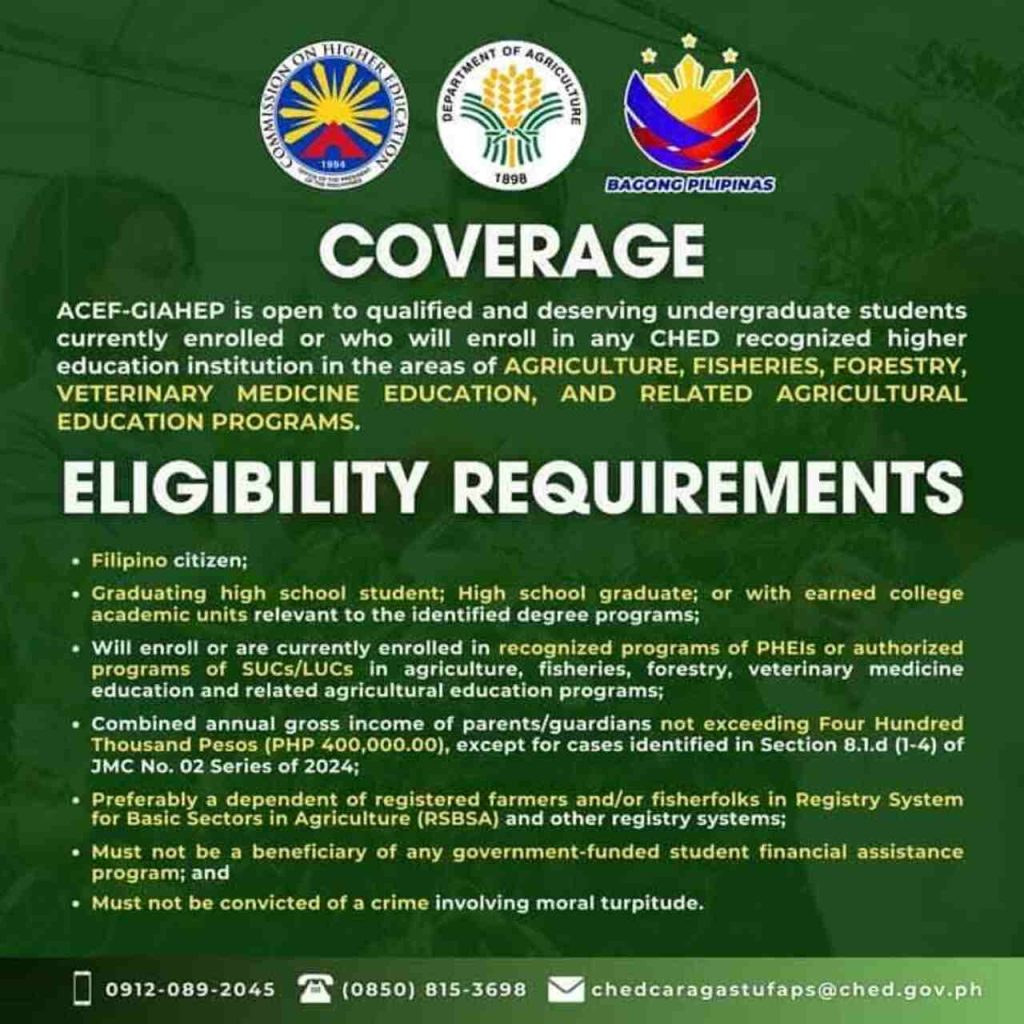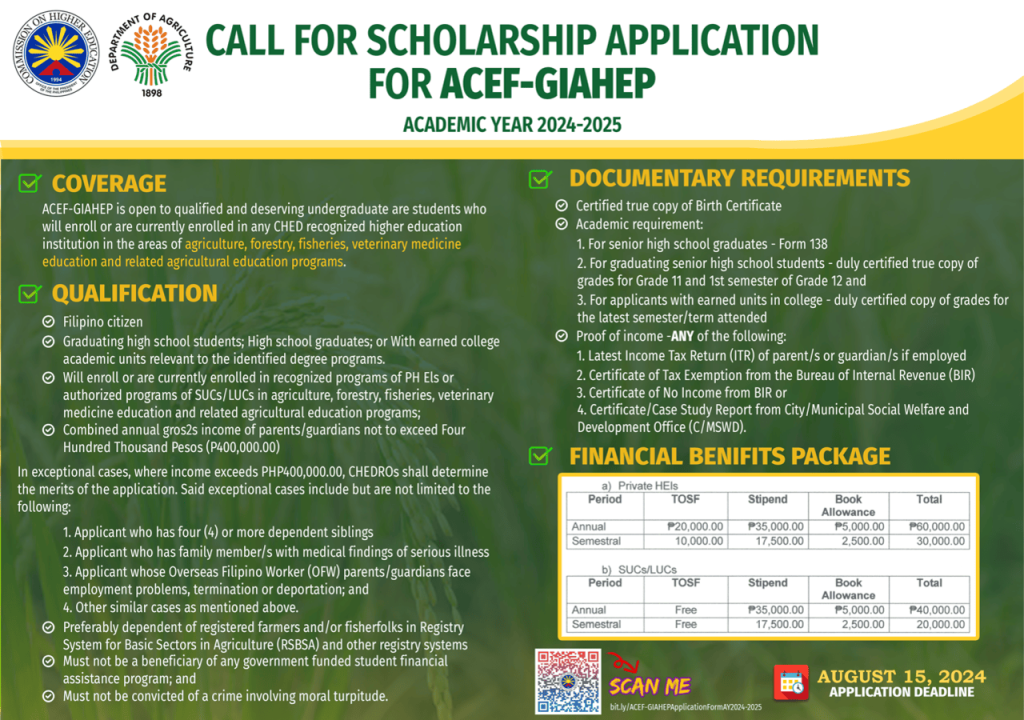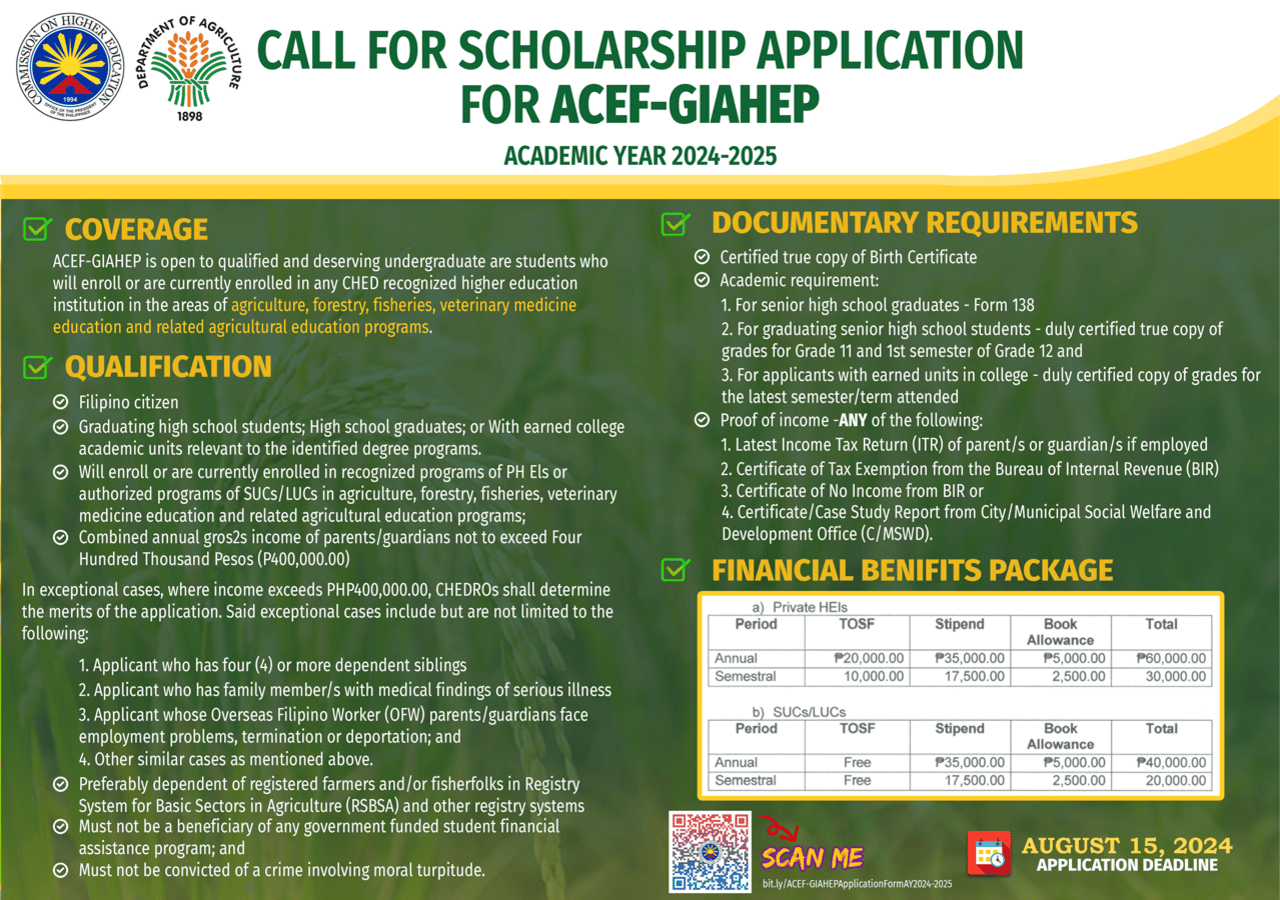The Agricultural Competitiveness Enhancement Fund – Grants-in-Aid for Higher Education Program (ACEF-GIAHEP) offered by CHED (Commission on Higher Education) provides financial assistance to qualified students pursuing degrees in agriculture, forestry, fisheries, veterinary medicine, and related fields. Implemented under Republic Act No. 10848, this initiative aims to boost agricultural development through education and training.
By supporting deserving students, the ACEF-GIAHEP contributes to increasing the number of graduates equipped with technical skills and scientific knowledge in agriculture-related sectors. If you are seeking financial assistance for higher education in this field, understanding the application process and requirements will guide you toward securing this scholarship.
Program Overview
The ACEF-GIAHEP is rooted in R.A. No. 7722, the “Higher Education Act of 1994,” which promotes equal access to quality higher education for all Filipinos. It is supported by R.A. No. 10848, which extends the period of implementation of the Agricultural Competitiveness Enhancement Fund (ACEF) and was designed to provide grants to students enrolled in agriculture, forestry, fisheries, and veterinary medicine programs, prioritizing those from disadvantaged communities. The program seeks to uplift the agricultural sector by equipping students with the necessary skills to drive agricultural productivity and efficiency.
According to Article XIV, Section 1 of the Philippine Constitution, the government is responsible for ensuring that education is accessible to all citizens, especially the underprivileged. This principle is reinforced by various laws, such as R.A. No. 8178, which focuses on making the agricultural sector globally competitive, and R.A. No. 8435, which emphasizes equitable distribution of opportunities and increasing national productivity. Additionally, the program also complements existing initiatives such as RA 10931, the Universal Access to Quality Tertiary Education Act (UAQTEA), which seeks to make tertiary education more accessible, and RA 10687, the “UniFAST Act,” which streamlines financial assistance for students across the country. With all these going on, the government aims to create a well-rounded approach to agricultural development by making education more accessible and by providing financial assistance to students enrolled in agriculture-related degree programs in CHED-recognized higher education institutions (HEIs).
Priority Degree Programs
The ACEF-GIAHEP focuses on fields that directly benefit the agriculture and fisheries sectors. These include:
- Agriculture
- Forestry
- Fisheries
- Veterinary Medicine
- Other related agricultural education programs
Students pursuing any of these degrees will receive priority under this program, aligning with its goal of fostering growth in agriculture-based industries.
Benefits
The program offers several benefits to successful scholarship applicants. These benefits include:
- Financial assistance covering tuition fees, stipends, and book allowances for students in agriculture, forestry, fisheries, veterinary medicine, and related fields.
- For State Universities and Colleges (SUCs):
- The financial assistance granted is Php 15,000 per semester for each qualified beneficiary.
- Tuition and other school fees are covered up to a maximum of Php 20,000 per semester.
- For Private Higher Education Institutions (PHEIs):
- The financial assistance granted is Php 15,000 per semester for each qualified beneficiary.
- Tuition and other school fees are covered up to a maximum of Php 20,000 per semester.
- Transportation allowance may also be provided for beneficiaries, depending on the location and distance from the institution.
- For State Universities and Colleges (SUCs):
- A maximum annual stipend of ₱35,000 for students in private higher education institutions (PHEIs) and ₱40,000 for those in state universities and colleges (SUCs) or local universities and colleges (LUCs).
- A book allowance of ₱5,000 per year for all grantees.
- Priority for students from underprivileged and special groups such as persons with disabilities, solo parents, senior citizens, indigenous peoples, and registered farmers and fisherfolks.
- Financial benefits for both new and continuing students, paid directly to the grantee or through the higher education institution.
- Opportunities for students to pursue higher education in agriculture-related fields, fostering the development of the agricultural and fisheries sectors in the Philippines.
- A waiver for tuition fees for students enrolled in SUCs and LUCs under the UAQTEA.
- Support for students from regions with higher poverty incidence and food production capabilities, ensuring equitable distribution of scholarships across the country.
Target Beneficiaries
According to the joint memorandum between the Commission on Higher Education (CHED) and the Department of Agriculture (DA), the program is designed to prioritize students from various special groups, ensuring accessibility to higher education for those from farming communities. The target beneficiary groups include:
- Underprivileged and Homeless Citizens (RA No. 7279)
- Persons with Disabilities (PWDs) (RA No. 7277 as amended)
- Solo Parents and/or their Dependents (RA 8972)
- Senior Citizens (RA 9994)
- Indigenous Peoples (RA 8371)
- Magna Carta of the Poor (RA No. 11291)
- First-generation students
- Registered farmers and fisherfolks in the Registry System for Basic Sectors in Agriculture (RSBSA) or their dependents
- Students who are dependents of registered farmers and fisherfolk
Eligibility Requirements
To qualify for the scholarship program, applicants must meet the following criteria:

- Filipino Citizen
- Applicants must be Filipino citizens pursuing agriculture-related education.
- Educational Background
- Graduating senior high school students,
- High school graduates, or
- Those with earned college units related to agriculture, forestry, fisheries, or veterinary medicine are eligible
- Income Requirement
- The combined annual gross income of parents or guardians must not exceed ₱400,000.
- Special cases where income exceeds ₱400,000 may still be considered under the following circumstances:
- Applicants with four or more dependent siblings.
- Families with members facing serious medical conditions.
- OFW parents/guardians experiencing termination, deportation, or employment issues.
- Special Preference
- Dependents of registered farmers and fisherfolk listed under the Registry System for Basic Sectors in Agriculture (RSBSA) or similar systems.
- Other Qualifications
- Must not be a recipient of other government-funded financial assistance programs.
- No prior conviction for crimes involving moral turpitude.
By fulfilling these requirements, the applicants can pursue the scholarship application and choose from any of the priority agricultural fields while securing financial support from CHED.
Required Documents
Applicants also need to prepare and submit the following documents to support their eligibility claims and complete their application:
- Proof of Identity
- Certified true copy of Birth Certificate
- Academic Records
- For senior high school graduates: Form 138
- For graduating senior high school students: Certified true copy of grades from Grade 11 and the first semester of Grade 12
- For college students with earned units: Certified copy of grades from the latest semester/term attended
- Proof of Income (any of the following):
- Latest Income Tax Return (ITR) of parents/guardians
- Certificate of Tax Exemption from the Bureau of Internal Revenue (BIR)
- Certificate of No Income from BIR.
- Certificate or Case Study Report from the City/Municipal Social Welfare and Development Office (C/MSWD)
- Special Group Certification
- Proof of inclusion in special groups, if applicable (e.g., RSBSA registration)
Having these documents ready will streamline the application process and improve the chances of being approved for the scholarship program.

Application Procedure
To apply for the ACEF-GIAHEP, follow these simple steps:
Step 1. Obtain the application form from either the DA Central/Regional Field Office, CHED Office of Student Development and Services (CHED OSDS) or CHED Regional Office (CHEDRO) located across the country, including CAR, NCR, and all regional offices from CHEDRO I to CHEDRO XII, BARMM, and other designated areas.
Step 2. Fill out the application form with the necessary details.
Step 3. Gather the required documentary requirements and make sure to prepare copies of each document for submission.
Step 4. Submit the completed application form along with the required documents to the CHEDRO.
Step 5. CHEDRO will evaluate the submitted documents and create a rank list of qualified applicants.
Step 6. The CHED OSDS will validate and approve the list of beneficiaries.
Step 7. The CHED OSDS will issue the corresponding award numbers based on regional slot allocations.
Step 8. Wait for the individual Notice of Award (NOA) sent by CHEDRO or the list of awardees posted through higher education institutions (HEIs).
Step 9. Accept the NOA by signing the return slip and submit it to the concerned CHEDRO within 15 working days.
Step 10. In case of waiver, write “WAIVED” on the return slip and return it to CHEDRO within 15 working days.
Note: The selection criteria for the CHED ACEF-GIAHEP is based on academic performance and financial need, with additional factors considered in the event of a tie for the last available spot. In case of a tie, the grantee will be selected based on the following order to ensure that the most deserving students receive the grants, with additional points awarded to those from special groups, such as persons with disabilities or indigenous people:
- Applicant with a higher General Weighted Average (GWA)
- Applicant with lower income
- Applicant with a higher number of siblings enrolled in higher education institutions
Once the application is completed successfully, applicants will receive financial assistance to support their education in agriculture-related programs.
Payment Procedures
The financial benefits are paid either directly to the students through their bank accounts or through the HEIs. CHEDROs are responsible for transferring funds based on the students’ enrollment status, ensuring that the grants are disbursed in a timely manner. The payment procedures are designed to ensure transparency and proper accountability, with students required to submit registration forms, grades, and other necessary documents to receive the financial aid.
Where to Get and Submit Applications
To secure the application form for the ACEF-GIAHEP, applicants must visit the official website of the CHED (https://bit.ly/ACEF-GIAHEPApplicationFormAY2024-2025). The form can also be obtained directly from the CHED Regional Offices. Additionally, the application form may be available at participating State Universities and Colleges (SUCs) and Private Higher Education Institutions (PHEIs). Applicants must then submit their requirements to the CHED Regional Office corresponding to their location. For further details, contact the CHED Regional Office nearest you to confirm submission schedules and additional requirements.
Important Notes for Applicants and Grantees
Applicants should be aware of certain important reminders and rules when applying for the ACEF-GIAHEP to ensure eligibility and successful grant management.
- Only students enrolled in recognized agricultural programs are eligible.
- Applicants must not be beneficiaries of other government financial assistance programs.
- Grantees must maintain a regular course load and complete their program within the prescribed duration.
- The grant will be terminated if the grantee fails to meet academic requirements or violates program rules.
- Grantees must not avail other government-funded scholarships or grants during the course of the program.
- Any changes in enrollment must be approved by CHED.
Video: First ACEF-GIAHEP Summit Luzon Cluster
For more information on the ACEF-GIAHEP, check out this video from the DA official Facebook page. It explains the program benefits, eligibility criteria, and everything else you need to know about the scholarship at the first ACEF-GIAHEP summit for Luzon grantees.
Summary
The CHED Agricultural Competitiveness Enhancement Fund – Grants-in-Aid for Higher Education Program (ACEF-GIAHEP) is a valuable opportunity for students pursuing agriculture-related degrees. Open to qualified applicants, this program provides financial assistance for tuition, stipends, and book allowances. By supporting education in agriculture, forestry, and fisheries, it strengthens the country’s agricultural workforce. Interested students should gather their documents, meet the eligibility criteria, and submit applications through CHED Regional Offices. Don’t miss this chance to achieve your educational goals and contribute to agricultural development in the Philippines.
